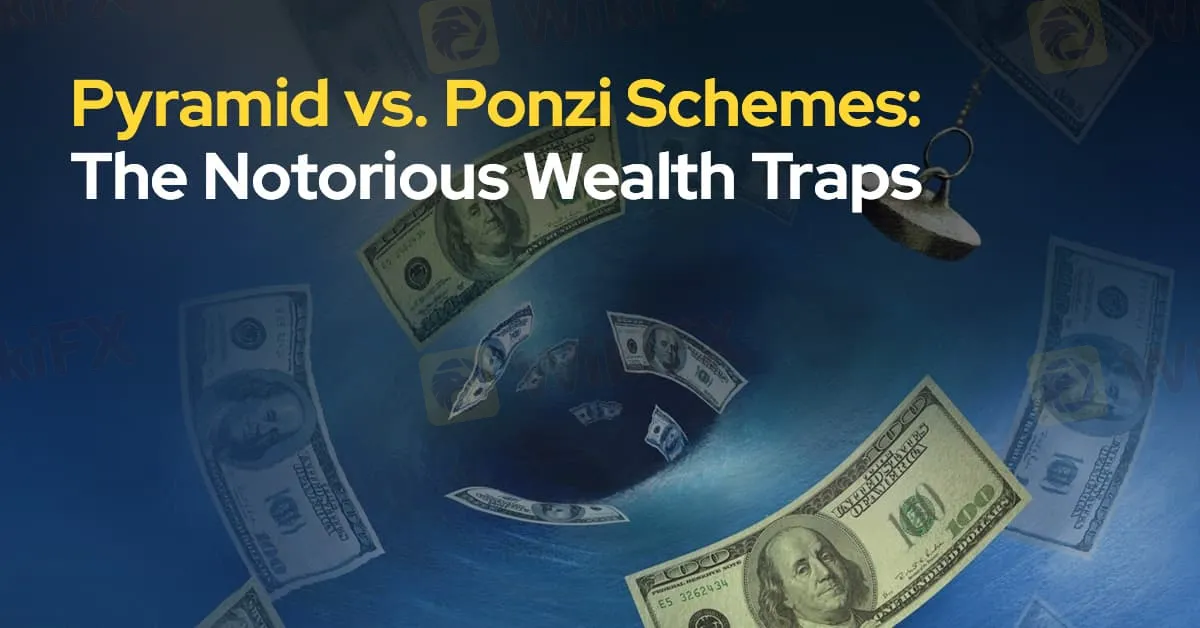Pyramid vs. Ponzi Schemes: The Notorious Wealth Traps
Abstract:Two of the most notorious frauds are the pyramid scheme and the Ponzi scheme. Understanding these differences is essential for avoiding these traps and recognizing the red flags of financial fraud.

In the world of finance, there are schemes that promise riches and success, but often leave participants with nothing but loss. Two of the most notorious frauds are the pyramid scheme and the Ponzi scheme. Both exploit trust and thrive on deception, yet while they share similarities, they also have significant differences that set them apart. Understanding these differences is essential for avoiding these traps and recognizing the red flags of financial fraud.

At their core, both pyramid and Ponzi schemes rely on the same principle: using new investors money to pay off earlier participants. They often lure people in with the promise of high returns in a short amount of time, creating the illusion of a legitimate and profitable enterprise. However, neither structure generates any real profits. The payouts depend solely on the continuous recruitment of new participants or fresh investments, making them inherently unsustainable. When the flow of new participants slows down, both schemes quickly collapse, leaving the majority of people with significant financial losses.

A pyramid scheme primarily focuses on recruitment. Participants are required to pay an entry fee or invest in a product, with the promise of earning commissions based on recruiting new members. As new recruits join and pay their fees, a portion of the money flows upwards, benefiting those higher in the pyramid. The incentive to recruit becomes the primary driver of the scheme, with little to no emphasis on actual products or services being sold. Over time, the pool of potential new recruits dries up, causing the pyramid to crumble.

Ponzi schemes, on the other hand, focus on fraudulent investment opportunities. Here, a central figure or entity promises consistent, often outrageously high returns. Early investors may indeed receive payouts, but these payments come directly from the funds of new investors. The scheme is kept alive by continuing to attract fresh capital. Unlike pyramid schemes, Ponzi participants are not required to recruit others. Instead, they are led to believe their money is being invested in legitimate ventures, while in reality, its being used to keep up the façade. Eventually, when there aren't enough new investors to cover withdrawals, the scheme collapses.

The key distinction between the two lies in their structure. Pyramid schemes are heavily recruitment-focused, relying on a growing base of participants to sustain payouts, while Ponzi schemes hinge on the deception of a centralized operator pretending to invest funds. In pyramid schemes, individuals are encouraged to recruit others to earn money. In contrast, Ponzi schemes do not require recruitment from participants; instead, they believe their returns come from legitimate investments.
Despite the numerous legal crackdowns, these schemes continue to reappear, often disguised under different names or dressed up as “multi-level marketing” or “high-return investment” opportunities. They persist because they exploit the human desire for quick wealth and capitalize on the trust and greed that can cloud judgment.
In both cases, the outcome is the same: the majority lose money, while only a few at the top of the scheme profit—until the system inevitably collapses. The lesson? If an opportunity seems too good to be true, it probably is. Recognizing the telltale signs of both pyramid and Ponzi schemes can save you from becoming the next victim of financial fraud.

Read more

Geopolitical Events: What They Are & Their Impact?
You've heard many times that geopolitical events have a significant impact on the Forex market. But do you know what geopolitical events are and how they affect the FX market? Let us learn about it today.

Why Do You Feel Scared During Trade Execution?
Trade execution is a pivotal moment for traders. It is when analysis turns into action, and potential profits or losses become reality. However, for many traders, this moment is accompanied by fear. Why does this happen, and how can you address it?

WikiEXPO Global Expert Interview: Simone Martin—— Exploring Financial Regulation Change
In the midst of financial innovation and regulation, WikiGlobal, the organizer of WikiEXPO, stays abreast of industry trends and conducts a series of insightful and distinctive interviews on pivotal topics. We are delighted to have the privilege of inviting Simone Martin for an in-depth conversation this time.

MultiBank Group Wins Big at Traders Fair Hong Kong 2024
Discover how MultiBank Group, a global leader in financial derivatives, secured three prestigious awards at Traders Fair Hong Kong 2024, highlighting its innovative trading solutions and industry excellence.
WikiFX Broker
Latest News
Volkswagen agrees deal to avoid Germany plant closures
Geopolitical Events: What They Are & Their Impact?
Top 10 Trading Indicators Every Forex Trader Should Know
WikiEXPO Global Expert Interview: Simone Martin—— Exploring Financial Regulation Change
TradingView Launches Liquidity Analysis Tool DEX Screener
MultiBank Group Wins Big at Traders Fair Hong Kong 2024
'Young investors make investment decisions impulsively to keep up with current trends' FCA Reveals
Why Do You Feel Scared During Trade Execution?
CySEC Settles Compliance Case with Fxview Operator Charlgate Ltd
Malaysian Influencer Detained in Taiwan Over Alleged Role in Fraud Scheme
Rate Calc
